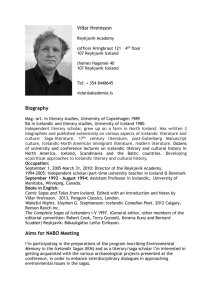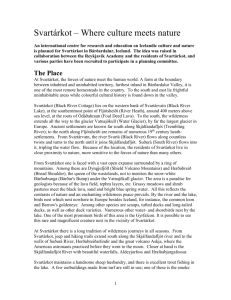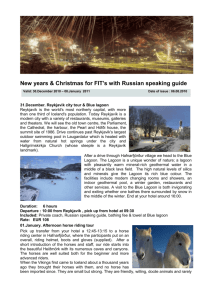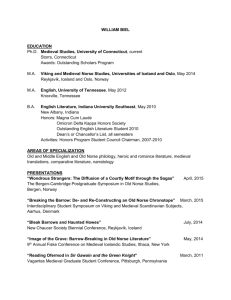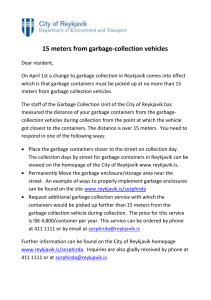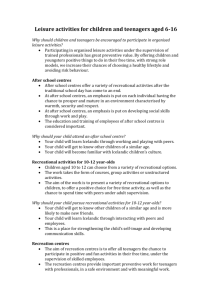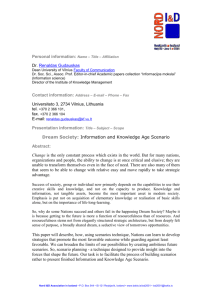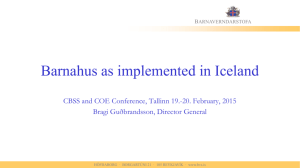Speech of Mayor of Reykjavík
advertisement
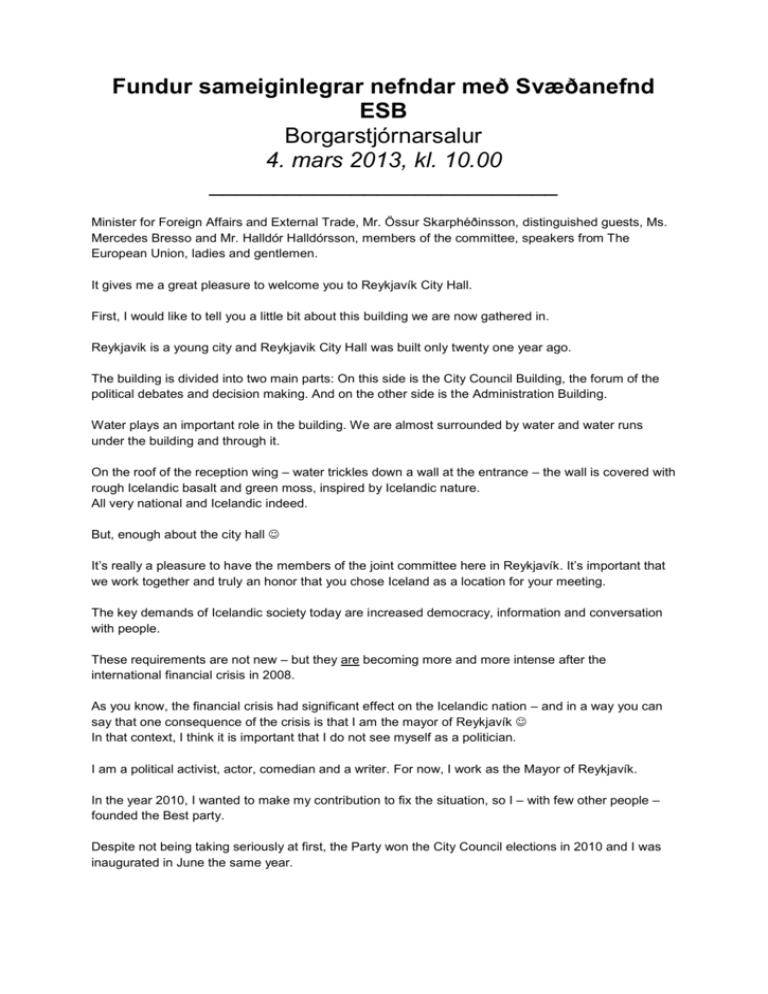
Fundur sameiginlegrar nefndar með Svæðanefnd ESB Borgarstjórnarsalur 4. mars 2013, kl. 10.00 ___________________________ Minister for Foreign Affairs and External Trade, Mr. Össur Skarphéðinsson, distinguished guests, Ms. Mercedes Bresso and Mr. Halldór Halldórsson, members of the committee, speakers from The European Union, ladies and gentlemen. It gives me a great pleasure to welcome you to Reykjavík City Hall. First, I would like to tell you a little bit about this building we are now gathered in. Reykjavik is a young city and Reykjavik City Hall was built only twenty one year ago. The building is divided into two main parts: On this side is the City Council Building, the forum of the political debates and decision making. And on the other side is the Administration Building. Water plays an important role in the building. We are almost surrounded by water and water runs under the building and through it. On the roof of the reception wing – water trickles down a wall at the entrance – the wall is covered with rough Icelandic basalt and green moss, inspired by Icelandic nature. All very national and Icelandic indeed. But, enough about the city hall It’s really a pleasure to have the members of the joint committee here in Reykjavík. It’s important that we work together and truly an honor that you chose Iceland as a location for your meeting. The key demands of Icelandic society today are increased democracy, information and conversation with people. These requirements are not new – but they are becoming more and more intense after the international financial crisis in 2008. As you know, the financial crisis had significant effect on the Icelandic nation – and in a way you can say that one consequence of the crisis is that I am the mayor of Reykjavík In that context, I think it is important that I do not see myself as a politician. I am a political activist, actor, comedian and a writer. For now, I work as the Mayor of Reykjavík. In the year 2010, I wanted to make my contribution to fix the situation, so I – with few other people – founded the Best party. Despite not being taking seriously at first, the Party won the City Council elections in 2010 and I was inaugurated in June the same year. 2 In my opinion the citizens of Reykjavik made democratic revolution when the plurality voted for the Best Party – which is a backlash against establishment parties. As a mayor I put emphasis on peace on earth, human rights and last but not least: increased democracy. I am very interested in improving democratic debate and I want the citizens to participate in decisionmaking. It is my opinion that municipalities play an important democratic role because they are the authority which is closest to the people. Municipalities can therefore provide citizens with opportunities for discussion and participation in direct democracy. In Iceland we have a long history of local government. The independence of local governments was formally abolished in 1809 and regained on 4 th of May in 1872. It’s the 78th article of the Icelandic constitution which ensures the local governments certain political rights. In the article it says that the municipalities shall manage their affairs independently, as laid down by law. Also, that the income sources of the municipalities and the right of the municipalities to decide whether and how to use their sources of income shall be regulated by law. The article is based on the democratic idea that the population should have the right to have a direct impact on their local communities. Its origin is from the Danish constitution and the goal was to adopt the philosophy of the French Declaration of Human Rights: The government should originate from the people. The city authorities have been working in this direction for some time. We try to work in this spirit and we have systematically moved some of our power to the citizens. Over a year ago, the City of Reykjavik took a big step towards a more local democracy by launching the website Betri Reykjavík – or Better Reykjavik. The website is an online forum for democratic development – or a tool for the people of Reykjavík to post their ideas and opinions regarding everything relating to the policy, priorities or the service that the city provides. The idea behind the website is that citizens can have direct impact on their own environment and the service they need from the city. The website is open for everyone to view or share an idea. Everybody can contribute – users only need to sign up to the game before they can post or discuss ideas. To explain it better – the website Better Reykjavík works as a forum where registered users can submit ideas, reject or accept ideas, discuss their pros and cons – and give ideas weight of importance. 3 We use modern technology to create a window for citizens into the administration and the result is that citizens and politicians have conversations over the web. This empowers citizens, increases their participation and encourages democratic deliberation. But the most important part is that the website is not just a forum. The City Council in Reykjavik is committed to take the most popular ideas on the website and put them before respective expert committees within the city administration. The ideas that have the most support are sent to expert committees as a formal administrative proposal. Every month, the city will formally receive the top five ideas from the web, along with the top ideas in each category, a total of thirteen ideas. This means that the website is now a part of the city administration. The website Better Reykjavik also hosts another project – which we call Better Neighborhoods. In that project, citizens participate in the city’s budgeting by voting for minor construction and maintenance work. The arrangement was that we divided 1.9 million €uros between 10 neighborhoods and citizens choose between up to 26 proposals in a formal election. The first election took place on the 29th of March to 4th of April, last year. The voting was online – with secure authentication – and all citizens of Reykjavik older than 16 years could vote. In total 7,617 people were authenticated in the election and the participation was 8,1 percent. In April we intend to repeat the elections – with the same amount of money. We would like twice as many people to vote. Recently, we had meetings with all city districts to collect and discuss ideas. We encouraged people to participate and submit their ideas on the website. This has been successful – we have a 100% increase in ideas submitted on the web. It’s our hope that in time the website will continue to develop and will become a powerful, democratic instrument. I said before that as a mayor I emphasize peace, human rights and democracy. In my mind, those issues are closely related. Icelanders as a nation stand proud in supporting the rights of LGBT-people and are eager to share with the world how much a nation can benefit from embracing human rights for all. Peace is the strength of our city and our nation – and Reykjavik has also a unique position as a city of democracy. 4 Reykjavík is a young city which has grown very fast, mainly during the latter part of the twentieth century. In the year nineteen hundred the inhabitants of Reykjavik were five thousand and eight hundred. There were only two stone buildings in the city – a cathedral and a prison – while the rest of the buildings were humble wooden and turf houses. Today, Reykjavík is a modern and international city with about hundred and twenty thousand inhabitants. We have a great place to experiment with democracy –because here you’ll find the mind of a big city trapped in a body of a joyful and fun dwarf We have no army here in Iceland– and as such, the City of Reykjavík has a responsibility among capitals of the world. The police do not carry guns. Instead, officers try to reason with people. It is my belief that it is important for our city to recognize our obligation and contribute to promoting peace. In this perspective, I am greatly interested in the context between architecture and peace – or buildings as monuments of peace. As you probably know, Ronald Reagan and Mikhail Gorbachev held a remarkable summit in Reykjavik in the year 1986 – which defined the end of the Cold War. The meeting was held in a house called Höfði – which means cape. The house itself is not remarkable in any way – or at least not from the perspective of architecture. It’s a catalog-house imported from Norway But the result of this meeting put Reykjavík – and the Höfði house in particular – in the spotlight across the globe. And this old, Norwegian catalog-house is one of the most famous landmarks in the city of Reykjavík. All of us – who call Reykjavík home – are proud of the Reykjavík Summit of October 1986. We are also proud of the Imagine Peace Tower which Yoko Ono designed and was placed in Videy Island, in memory of John Lennon. The light tower is lit every night from the 9th of October – the birthday of John Lennon – and until the 8th of December – the day of his death. The Imagine Peace Tower is another monument for peace – a tower of light which emanates wisdom, healing and joy. Finally, I would like to mention our new concert and conference hall Harpa. The construction work started during the boom in 2007, and it was inaugurated in 2010. When the financial crisis hit hard in 2008 it became a monument of the crash. 5 Today, Harpa is a symbol of our will to move forward and a stunning home for music and conferences. I’ve talked about lots of things in this speech – but the plan was probably that I would discuss the European Union I recently had lunch with Mickey Mouse in Paris where in fact these issues were brought up. We discussed the political situation in Iceland, the future of democracy and possibilities for Iceland if we joined the European Union. Mickey was really pleased with the joint committee and delighted about this meeting. He seemed a very nice guy and clearly a big fan of democracy. I want to end on Mickey’s notes: Democracy can be risky because the majority is not always right – but neither is the minority. Life is a risk, and time itself will reveal whether the decision taken today will be for a better tomorrow. On behalf of the City of Reykjavík I am truly honored that the inaugural meeting of the EU–Iceland Joint Consultative Committee is held here in the City of Reykjavík. I hope that you will have a fruitful meeting. Thank you.
